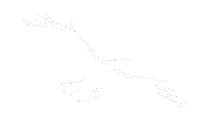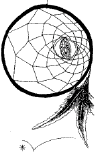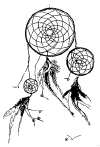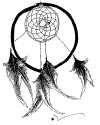CHAPTER XVII.
COMMENCEMENT OF BRITISH SUPREMACY.
The Ojibways of Lake Superior do not join the alliance of Pontiac against
the British--They are kept in the paths of peace through the influence of a
French trader at Sault Ste. Marie--John Baptiste Cadotte--His first
introduction into the Ojibway country--He marries a woman of the tribe, and
settles at Sault Ste. Marie--His influence--Character of his Indian
wife--Testimony of Alex. Henry--Henry proceeds to the Sault in Madame
Cadotte's canoe--Kind reception by Mons. Cadotte--A party of Indians seek
his life--He is preserved through Cadotte's influence--Sir Wm. Johnson sends
a message to the Ste. Marie's Ojibways--They send twenty deputies to the
Grand Council at Niagara--Return of peace--Ma-mong-e-se-da is sent from
Shaug-a-waum-ik-ong to Sir William Johnson to demand a trader--Brief sketch
of this chieftain's life--Henry and Cadotte enter into the far trade--They
work the copper mines--Grant of land at Sault Ste. Marie to Mons. Cadotte.
That portion of the Ojibways, forming by far the main body of
the tribe, who occupied the area of Lake Superior, and those bands who had
already formed distinct villages on the headwaters of the Mississippi and
its principal north-eastern tributaries, were not engaged in the bloody
transaction of the taking of Fort Michilimackinac, or at most, but a few of
their old warriors who have all now fallen into their graves, were noted as
having been accidentally present on the occasion of this most important
event in the history of their tribe.
It is true that the war-club, tobacco, and wampum belt of
war had been carried by the messengers of Pontiac and his lieutenant, the
Mackinaw chieftain, to La Pointe, and the principal villages of the tribe on
Lake Superior, but the Ojibways listened only to the advice and the words of
peace of a French trader who resided at Sault Ste. Marie, and from this
point (with an influence not even surpassed by that which his contemporary,
Sir Win. Johnson, wielded over the more eastern tribes), he held sway, and
guided the councils of the Lake Superior Ojibways, even to their remotest
village.
This man did not stand tamely by, as many of his fellow
French traders did, to witness the butchery of British soldiers and
subjects, and see the blood of his fellow whites ruthlessly and freely
flowing at the hands of the misguided savages. On the contrary, he feared
not to take a firm stand against the war, and made noble and effective
efforts to prevent the deplorable consequences, which their opposition to
the British arms, would be sure to entail on the Ojibways. He knew full well
that the French nation had withdrawn forever from their possessions in this
country, and that their national fire, which was promised would blaze
forever with the fire of the Ojibways, was now totally extinguished, and
knowing this, he did not foolishly stimulate, as others did, the sanguinary
opposition which the Indians continued to make against the predominant Saxon
race, by telling them that "the great king of the French had only fallen
into a drowse, but would soon awaken, and drive the English back into the
great salt water."
On the contrary, he pointed out to the Ojibways, the utter
uselessness and impotence of their efforts; and he told them that the war
would only tend to thin the ranks of their warriors, causing their women to
cover their faces with the black paint of mourning, and keep them miserably
poor, for the want of traders to supply their wants.
It is through the humane advice of this French trader, and
the unbounded influence which he held over the Lake Superior Ojibways, which
prevented them from joining the alliance of Pontiac, in his war against the
English, and which has thereby saved them from the almost utter annihilation
which has befallen every other tribe who have been induced to fight for one
type of the white race against another, and which enables them at this day
to assume the position of the most numerous and important branch of the
Algic race, and the largest tribe residing east of the Mississippi.
The name of this man was John Baptiste Cadotte, and he was
a son of the Mons. Cadeau who first appeared in the Ojibway country, as
early as in 1671, in the train of the French envoy, Sieur du Lusson, when he
treated with the delegates of the northwestern Indian tribes at Sault Ste.
Marie.
John Baptist Cadotte (as his name was spelt by the
British, and has been retained to this day) had, early in life, followed the
example of the hardy western adventurers who had already found their way to
the sources of the Great Lakes and the Great River, Mississippi. He went as
a "Merchant voyageur," and visited the remotest villages of the Ojibways on
Lake Superior, to supply their wants in exchange for their valuable beaver
skins. He became attached to one of their women, belonging to the great clan
of A-waus-e, and married her according to the forms of the Catholic
religion, of which he was a firm believer. For a notice of Cadot or Cadotte
gleaned from parish and other records, see another article in this
volume.--E. D. N.
At the breaking out of the war between France and Great
Britain, which resulted in the ending of the French domination in America,
Mons. Cadotte made it his permanent residence at Sault Ste. Marie, from
which point he eventually wielded the salutary influence, which we have
mentioned. He is the only French trader of any importance whom the Ojibways
tell of having remained with them, when the French people were forced to
leave the Lake Superior country. And it is said that though he made several
attempts to leave the Ojibway people in company with his departing
countrymen, such was the affection which they bore to himself and his
half-breed children, that their chiefs threatened to use force to prevent
his departure.
His Ojibway wife appears to have been a woman of great
energy and force of character, as she is noted to this day for the influence
she held over her relations--the principal chiefs of the tribe; and the
hardy, fearless manner, in which, accompanied only by Canadian "Coureurs du
bois" to propel her canoes, she made long journeys to distant villages of
her people to further the interests of her husband.
She bore him two sons, John Baptiste, and Michel, who
afterwards succeeded their father in the trade, and became, with their
succeeding children of the same name, so linked with the Ojibways, that I
shall be forced often to mention their names in the future course of my
narrative, although at the evident risk of laying myself open to the charge
of egotism, Or making them prominent because they happen to be my direct
progenitors.
Alex. Henry, in his straightforward and truthful
narrative, gives full testimony to all, which I have said respecting the
position and influence of Mons. Cadotte among the Ojibways during the middle
of the past century, and not only for the purpose of making known the noble
and philanthropic conduct of this man during this trying season in Ojibway
history, but also to more fully illustrate to the reader the position and
affairs of the tribe during this era, I will take the liberty to introduce a
few more paragraphs from his pen. In the spring of the following year after
his capture, having passed the winter as an Indian in the hunting camp of
his adopted brother Wa-wa-tam, in whose family he was ever kindly treated,he
returned to the fort at Michilimackinac, which now contained but two French
traders. He says:--
"Eight days had passed in tranquility, when there arrived a band of Indians
from the bay of Sag-u-en-auw (Saginaw.)
They had assisted at the siege of Detroit, and came to
muster as many recruits for that service as they could. For my own part, I
was soon informed that, as I was the only Englishman in the place, they
proposed to kill me, in order to give their friends a mess of English broth
to raise their courage. This intelligence was not of the most agreeable
kind, and in consequence of receiving it, I requested my friend to carry me
to the Sault de Saint Marie, at which place I knew the Indians to be
peaceably inclined, and that M. Cadotte enjoyed a powerful influence over
their conduct. They considered M. Cadotte as their chief, and he was not
only my friend, but a friend to the English. It was by him that the
Chippeways of Lake Superior were prevented from joining Pontiac."
conclude chapter 17
1
- 2
- 3
- 4
- 5
- 6
- 7
- 8
- 9
- 10
11
- 12
- 13
- 14
- 15
- 16
- 17
- 18
- 19
- 20
White Eagle Soaring: Dream Dancer of the 7th Fire







 Get
a course to promote your business online, explode your sales
Get
a course to promote your business online, explode your sales Get
software to promote your business online in less time
Get
software to promote your business online in less time Get
software to streamline your business and run it hands free.
Get
software to streamline your business and run it hands free.